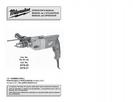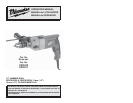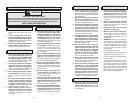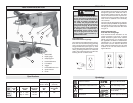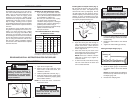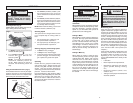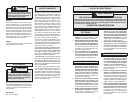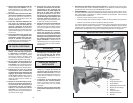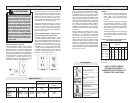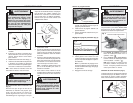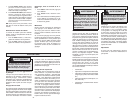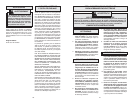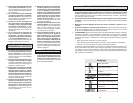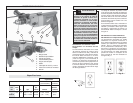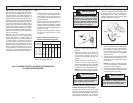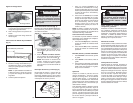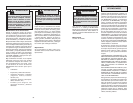
10 11
WARNING
To reduce the risk of injury, electric
shock and damage to the tool, never
immerse your tool in liquid or allow a
liquid to fl ow inside the tool.
Cleaning
Clean dust and debris from vents. Keep
the tool handles clean, dry and free of oil
or grease. Use only mild soap and a damp
cloth to clean your tool since certain cleaning
agents and solvents are harmful to plastics
and other insulated parts. Some of these
include: gasoline, turpentine, lacquer thinner,
paint thinner, chlorinated cleaning solvents,
ammonia and household detergents con-
taining ammonia. Never use fl ammable or
combustible solvents around tools.
Repairs
If your tool is damaged, return the entire tool
to the nearest service center.
ACCESSORIES
FIVE YEAR TOOL
LIMITED WARRANTY
WARNING
To reduce the risk of injury, always
unplug the tool before attaching or
removing accessories. Use only spe-
cifi cally recommended accessories.
Others may be hazardous.
For a complete listing of accessories refer to
your MILWAUKEE Electric Tool catalog or go
on-line to www.milwaukeetool.com. To obtain
a catalog, contact your local distributor or a
service center.
Side Handle
Cat. No. 49-15-5300
Every MILWAUKEE tool is tested before
leaving the factory and is warranted to be
free from defects in material and workman-
ship. MILWAUKEE will repair or replace (at
MILWAUKEE’s discretion), without charge,
any tool (including battery chargers) which
examination proves to be defective in ma-
terial or workmanship from fi ve (5) years
after the date of purchase. Return the tool
and a copy of the purchase receipt or other
proof of purchase to a MILWAUKEE Factory
Service/Sales Support Branch location or
MILWAUKEE Authorized Service Station,
freight prepaid and insured. This warranty
does not cover damage from repairs made
or attempted by other than MILWAUKEE au-
thorized personnel, abuse, normal wear and
tear, lack of maintenance, or accidents.
The warranty period for V28 Battery Packs
is two (2) years from the date of purchase.
The warranty period for Ni-Cd battery Packs,
Flashlights, Radios are warranted for one (1)
year from the date of purchase.
THE REPAIR AND REPLACEMENT REM-
EDIES DESCRIBED HEREIN ARE EXCLU-
SIVE. IN NO EVENT SHALL MILWAUKEE
BE LIABLE FOR ANY INCIDENTAL, SPE-
CIAL, OR CONSEQUENTIAL DAMAGES,
INCLUDING LOSS OF PROFITS.
THIS WARRANTY IS EXCLUSIVE AND IN
LIEU OF ALL OTHER WARRANTIES, OR
CONDITIONS, WRITTEN OR ORAL, EX-
PRESSED OR IMPLIED FOR MERCHANT-
ABLILITY OR FITNESS FOR PARTICULAR
USE OR PURPOSE.
This warranty gives you specifi c legal rights.
You may also have other rights that vary from
state to state and province to province. In
those states that do not allow the exclusion of
implied warranties or limitation of incidental
or consequential damages, the above limi-
tations or exclusions may not apply to you.
This warranty applies to the United States,
Canada, and Mexico only.
SÉCURITÉ DU LIEU
DE TRAVAIL
AVERTISSEMENT
LIRE SOIGNEUSEMENT TOUTES LES INSTRUCTIONS
Le non respect des instructions ci-après peut entraîner des chocs électriques, des
incendies et/ou des blessures graves. Le terme «outil électrique» fi gurant dans les
avertissements ci-dessous renvoie à l’outil électrique à alimentation par le réseau
(à cordon) ou par batterie (sans fi l).
CONSERVER CES INSTRUCTIONS
RÈGLES GÉNÉRALES DE SÉCURITÉ POUR
LES OUTILS ÉLECTRIQUE
1. Maintenir la zone de travail propre et bien
éclairée. Les zones encombrées ou mal
éclairées sont favorables aux accidents.
2. Ne pas utiliser d’outil électrique dans
une atmosphère explosive, telle
qu’en en présence de liquides, de
gaz ou de poussières infl ammables.
Les outils électriques génèrent des
étincelles qui peuvent enfl ammer les
poussières ou les fumées.
3. Tenir les enfants et les personnes
non autorisées à l’écart pendant le
fonctionnement d’un outil électrique.
Un manque d’attention de l’opérateur risque
de lui faire perdre le contrôle de l’outil.
4. La fi che de l’outil électrique doit cor-
respondre à la prise d’alimentation.
Ne jamais modifier la fiche d’une
manière quelconque. Ne pas utiliser
d’adaptateur avec les outils élec-
triques mis à la terre (à la masse).
Des fi ches non modifi ées et des prises
d’alimentation assorties réduisent le
risque de choc électrique.
5. Éviter tout contact corporel avec des
surfaces reliées à la masse ou à la
terre telles que tuyaux, radiateurs,
cuisinières et réfrigérateurs. Un risque
de choc électrique plus élevé existe si le
corps est relié à la masse ou à la terre.
6. Ne pas exposer les outils électriques
à la pluie ou à l’humidité. Le risque de
choc électrique augmente si de l’eau
s’infi ltre dans un outil électrique.
9. Être sur ses gardes, être attentif et
faire preuve de bon sens en utilisant
un outil électrique. Ne pas utiliser
un outil électrique en cas de fatigue
ou sous l’influence de drogues,
d’alcool ou de médicaments. Un
instant d’inattention lors de l’utilisation
d’un outil électrique peut entraîner des
blessures graves.
10. Utiliser un équipement de sécurité.
Toujours porter des lunettes de pro-
tection. Un équipement de sécurité
comprenant masque anti-poussière,
chaussures de sécurité anti-dérapantes,
casque ou dispositif de protection anti-
bruit peut, dans les circonstances appro-
priées, réduire le risque de blessure.
11. Éviter tout démarrage accidentel de
l’outil. S’assurer que le commutateur
est en position OFF (Arrêt) avant de
brancher l’outil. Le port de l’outil avec
un doigt sur le commutateur ou son
branchement avec le commutateur en
position ON (Marche) sont favorables
aux accidents.
7. Prendre soin du cordon. Ne jamais
utiliser le cordon pour transporter,
tirer ou débrancher l’outil électrique.
Tenir le cordon à l’écart de la chaleur,
des huiles, des arêtes coupantes ou
des pièces en mouvement. Un cordon
endommagé ou emmêlé présente un
risque accru de choc électrique.
8. Se procurer un cordon d’alimentation
approprié en cas d’utilisation
d’un outil électrique à l’extérieur.
L’utilisation d’un cordon d’alimentation
pour usage extérieur réduit le risque de
choc électrique.
SÉCURITÉ INDIVIDUELLE
SÉCURITÉ ÉLECTRIQUE













